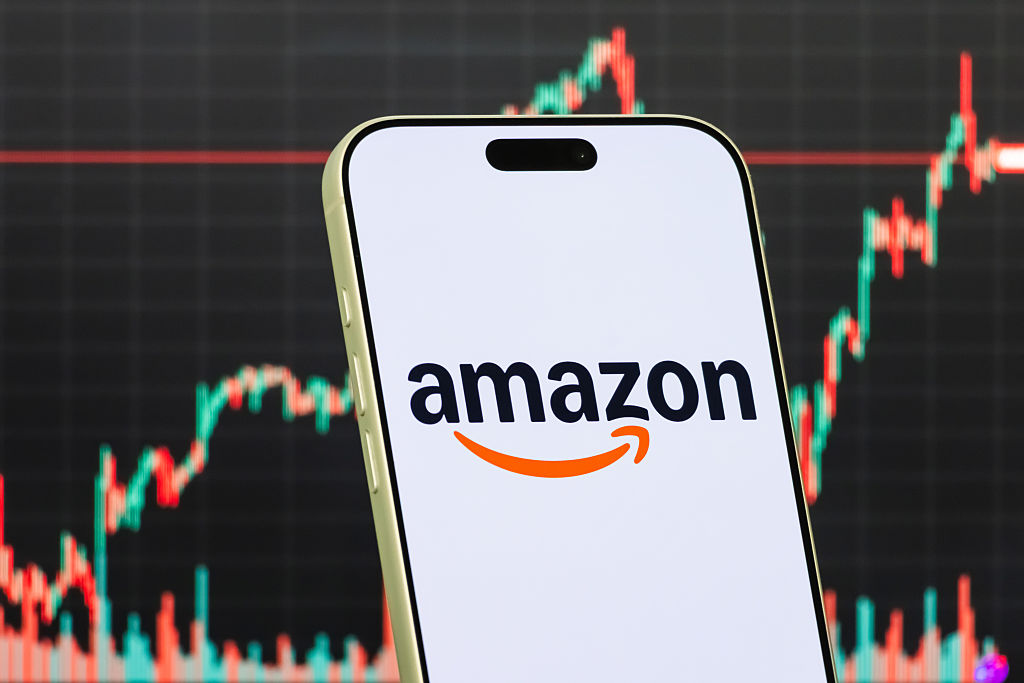Alphabet and Microsoft look like gems in the rubble of the tech sector
Tech stocks have fallen hard this, with the Nasdaq index down 22% since November. But both Alphabet and Microsoft are still both worth a look, says Rupert Hargreaves.


Get the latest financial news, insights and expert analysis from our award-winning MoneyWeek team, to help you understand what really matters when it comes to your finances.
You are now subscribed
Your newsletter sign-up was successful
Want to add more newsletters?

Twice daily
MoneyWeek
Get the latest financial news, insights and expert analysis from our award-winning MoneyWeek team, to help you understand what really matters when it comes to your finances.

Four times a week
Look After My Bills
Sign up to our free money-saving newsletter, filled with the latest news and expert advice to help you find the best tips and deals for managing your bills. Start saving today!
The tech-heavy Nasdaq index, which is frequently used as a benchmark for the tech sector, has crashed into a bear market. The index has fallen 22% from its record high close last November.
However, as my colleague Max King points out, the valuations of many quality growth stocks are now either “attractive or very attractive,” after being dragged down with the rest of the market.
As I recently noted – If you’re going to buy FANG stocks today, these are the three to focus on – companies with substantial competitive advantages and unique products are likely to pull through this turbulence, while corporations that lack any conceivable advantages over the competition are likely to continue to struggle.
MoneyWeek
Subscribe to MoneyWeek today and get your first six magazine issues absolutely FREE

Sign up to Money Morning
Don't miss the latest investment and personal finances news, market analysis, plus money-saving tips with our free twice-daily newsletter
Don't miss the latest investment and personal finances news, market analysis, plus money-saving tips with our free twice-daily newsletter
We’re already seeing this trend play out in figures from the streaming giant Netflix (Nasdaq: NFLX) and Facebook’s parent company Meta (Nasdaq: FB). These corporations are losing market share to competitors and there are plenty of other examples.
Peloton (Nasdaq: PTON), down 80% in a year, is just an exercise bike with a computer attached. Affirm (Nasdaq: AFRM) a “buy now pay later’’ company, has cratered 80% since November. Its product operates in a very similar way to credit cards. Robinhood (Nasdaq: HOOD), down 72% from its IPO price, is now just one of many online stockbrokers that offers fee-free mobile app trading.
None of these organisations offer anything new or unique, and all face stiff competition.
For a company to succeed in the long-term it needs to have a niche, and it needs to defend that niche from the competition.
On that front, at the other end of the spectrum we have corporations such as Google‘s parent Alphabet (Nasdaq: GOOG) and Microsoft (Nasdaq: MSFT).
Google’s competitive advantage keeps the competition at bay
Alphabet disappointed the market by reporting a $1.5bn drop in profits for the first three months of 2022 compared to the fourth quarter of 2021. A worse-than-expected performance from YouTube was the biggest disappointment. YouTube revenues only rose 14% to $6.9bn, below the $7.5bn expected by Wall Street analysts.
Overall, the company reported a 23% rise in revenue for the quarter to $68bn, slightly below the $68.1bn expected by analysts.
YouTube’s lacklustre revenue growth reflects the wider trend in the streaming and online content sector. Consumers and advertisers are overwhelmed with too much choice, and they are starting to refocus where they spend their time and money. This is the same headwind that Netflix and Facebook are having to deal with.
YouTube may have more than two billion daily users, but it’s not a unique service. Platforms such as Tik Tok and Instagram are copying its business model, and they’re not the only ones. The lack of any competitive advantage is harming the company’s growth. I would not be surprised if this trend continues.
But where Google really has the edge is in search and services. Both of these divisions reported blow-out performances for the first quarter. Revenue from Google Search jumped 24% year-on-year to $39.6bn. The division now accounts for 58% of total revenue. Meanwhile, Google Cloud revenues expanded 44% to $5.8bn.
These divisions have huge competitive advantages. Google Search is one of the digital world’s most valuable assets. The Google brand alone is worth $263bn. It also has over two decades of data available to help users find the information they need. To back up its brand and data avantage, Google owns over $100bn of assets, mostly data centres, to process information and power Google Cloud.
Based on these numbers, a competitor would need around $400bn to build a brand capable of taking on Google in the search and cloud business. That’s out of reach for all but a tiny fraction of the corporate world.
Microsoft: a vital service for the corporate world
Microsoft exhibits similar competitive advantages. It has a world-renowned brand and has spent tens of billions building the infrastructure and software required to create and sustain a world-leading cloud and computer services business.
The company’s first quarter figures support this idea as revenues during the three months to the end of March jumped 18% to $49.4bn, beating Wall Street expectations.
The “more personal computing” division, which includes its PC and gaming businesses, reported revenue growth of 11%, while intelligent cloud revenue jumped 26% and the productivity and business process unit grew 17%. The company also revealed that demand for its cloud services is accelerating as customers press ahead with the digitisation plans.
In many respects, cloud computing is already a commoditised industry, but Microsoft and Google stand out because they offer services as well. They offer access to services such as AI systems and the suites of Microsoft Office and Google Workspace – all valuable resources for other businesses.
Bargains are emerging from the rubble of the tech sell-off, but investors need to be careful. The world of business is only becoming more competitive, and companies without a durable advantage are going to continue to struggle.
My money’s on stocks like Alphabet and Microsoft, which have a clear advantage over the competition and the resources to keep improving the customer experience.
Get the latest financial news, insights and expert analysis from our award-winning MoneyWeek team, to help you understand what really matters when it comes to your finances.

Rupert is the former deputy digital editor of MoneyWeek. He's an active investor and has always been fascinated by the world of business and investing. His style has been heavily influenced by US investors Warren Buffett and Philip Carret. He is always looking for high-quality growth opportunities trading at a reasonable price, preferring cash generative businesses with strong balance sheets over blue-sky growth stocks.
Rupert has written for many UK and international publications including the Motley Fool, Gurufocus and ValueWalk, aimed at a range of readers; from the first timers to experienced high-net-worth individuals. Rupert has also founded and managed several businesses, including the New York-based hedge fund newsletter, Hidden Value Stocks. He has written over 20 ebooks and appeared as an expert commentator on the BBC World Service.
-
 Early signs of the AI apocalypse?
Early signs of the AI apocalypse?Uncertainty is rife as investors question what the impact of AI will be.
-
 Reach for the stars to boost Britain's space industry
Reach for the stars to boost Britain's space industryopinion We can’t afford to neglect Britain's space industry. Unfortunately, the government is taking completely the wrong approach, says Matthew Lynn
-
 Is the AI boom a bubble – and will it burst?
Is the AI boom a bubble – and will it burst?Massive spending on AI infrastructure is starting to spook investors, but experts say the bubble doesn’t look like bursting yet
-
 Should you invest in Microsoft?
Should you invest in Microsoft?Microsoft is set to become the second company in the world to reach a $4 trillion valuation. Is now a good time to invest in Microsoft?
-
 Amazon stock falls as AWS results underwhelm
Amazon stock falls as AWS results underwhelmApple stock rose after earnings on a return to growth in China; Amazon's share price fell despite an earnings beat
-
 Tesla shares fall after-hours, while Alphabet's gain on earnings beat
Tesla shares fall after-hours, while Alphabet's gain on earnings beatAI positivity drove Alphabet's shares to new heights, but Musk's "rough quarters" warning saw Tesla's share price slump
-
 Nvidia dethrones Microsoft to become world’s most valuable company - should you invest?
Nvidia dethrones Microsoft to become world’s most valuable company - should you invest?The chipmaker’s share price continues to soar, leaving all in its wake. What is behind Nvidia’s rise?
-
 Should you invest in sector funds?
Should you invest in sector funds?Sector funds can be a useful way to fine-tune a portfolio or track a theme, but check what the index holds.
-
 Amazon shares fall on profitability concerns
Amazon shares fall on profitability concernsA big increase in capital spending plans compounded an earnings miss for Amazon following its Q4 results
-
 Halifax: House price slump continues as prices slide for the sixth consecutive month
Halifax: House price slump continues as prices slide for the sixth consecutive monthUK house prices fell again in September as buyers returned, but the slowdown was not as fast as anticipated, latest Halifax data shows. Where are house prices falling the most?